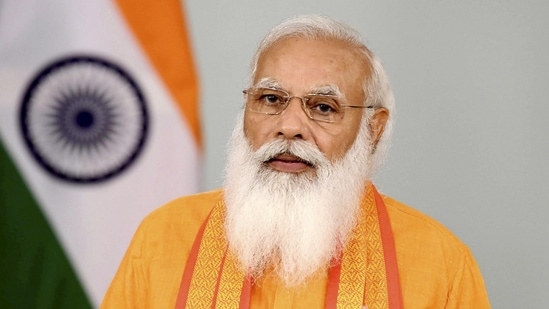'Pleasant departure from past': PM Modi praises Centre-state cooperation amid pandemic
PM Modi said in May 2020, as part of the Aatmanirbhar Bharat package, the Centre announced that state governments would be allowed enhanced borrowing for 2020-21.
Prime Minister Narendra Modi on Tuesday praised the cooperation between the Centre and states amid the coronavirus pandemic saying that they were able to borrow significantly more in 2020-21 and raise an extra ₹1.06 lakh crore. PM Modi said, in a blog on LinkedIn, 23 states availed of additional borrowings of ₹1.06 lakh crore out of a potential ₹2.14 lakh crore.

"This significant increase in the availability of resources was made possible by an approach of Centre-State bhagidari. When we formulated our economic response to the Covid-19 pandemic, we wanted to ensure that our solutions do not follow a ‘one size fits all’ model," PM Modi wrote in the blog "Reforms by Conviction and Incentives".
"For a federal country of continental dimensions, finding policy instruments at the national level to promote reforms by State Governments is indeed challenging. But, we had faith in the robustness of our federal polity and we moved ahead in the spirit of Centre-State bhagidari," he said.
PM Modi said in May 2020, as part of the Aatmanirbhar Bharat package, the Centre announced that state governments would be allowed enhanced borrowing for 2020-21. An extra 2 per cent of gross state domestic product (GSDP) was allowed, of which 1 per cent was made conditional on the implementation of certain economic reforms, he added.
This was a nudge, which PM Modi called "rare in Indian public finance", incentivising the states to adopt progressive policies to avail additional funds. "The results of this exercise are not only encouraging but also run contrary to the notion that there are limited takers for sound economic policies," he added.
Also read | As Bengal battle persists, lessons from Vajpayee-era on Centre-state tensions
The reforms were linked to "improving the Ease of Living to the public and particularly the poor, the vulnerable, and the middle class. Secondly, they also promoted fiscal sustainability". A financial incentive of .25 per cent was attached to each reform.
PM Modi wrote that the four reforms to which additional borrowings were linked had two characteristics. Each of the reforms was linked to "improving the Ease of Living to the public and particularly the poor, the vulnerable, and the middle class. Secondly, they also promoted fiscal sustainability", he said.
The first reform under the One Nation One Ration Card policy required state governments to ensure that all ration cards under the National Food Security Act (NFSA) were linked with the Aadhaar numbers of all family members and that all fair price shops had electronic point of sale devices. "The main benefit from this is that migrant workers can draw their food ration from anywhere in the country," he said.
"The second reform, aimed at improving ease of doing business, required states to ensure that renewal of business-related licences under 7 Acts is made automatic, online and non-discretionary on mere payment of fees," he wrote.
Also read | Navigating Centre-state fiscal ties
"The third reform required states to notify floor rates of property tax and of water & sewerage charges, in consonance with stamp duty guideline values for property transactions and current costs respectively, in urban areas. This would enable a better quality of services to the urban poor and middle class, support better infrastructure and stimulate growth," he wrote.
The fourth reform was the introduction of Direct Benefit Transfer or DBT in lieu of free electricity supply to farmers.
This was a pleasant departure from the past and the Centre and states came together to roll out public-friendly reforms in a short span of time amidst the pandemic. "This was made possible due to our approach of Sabka Saath, Sabka Vikas and Sabka Vishwas. Officials who have been working on these reforms suggest that without this incentive of additional funds, the enactment of these policies would have taken years. India has seen a model of ‘reforms by stealth and compulsion’. This is a new model of ‘reforms by conviction and incentives’," he said.
Get Current Updates on India News, Lok Sabha Election 2024 live, Elections 2024, Election 2024 Date along with Latest News and Top Headlines from India and around the world.



